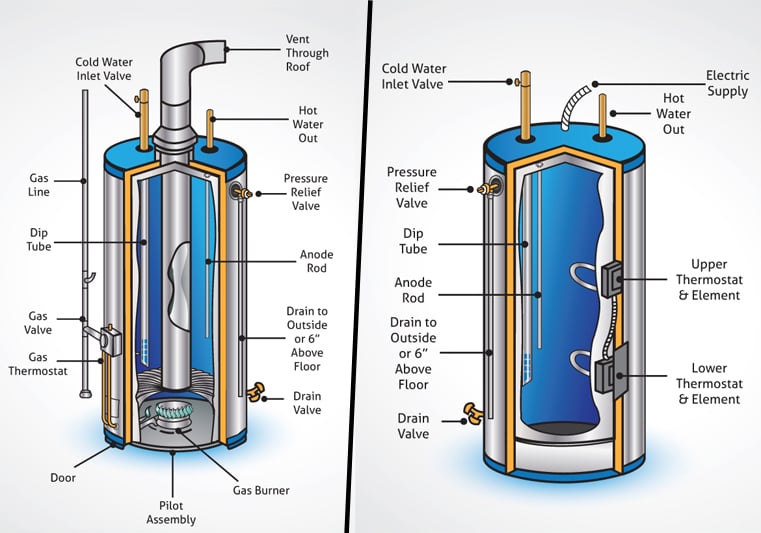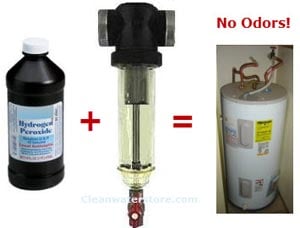Easily Eliminate Water Heater Odors with This Inexpensive Setup


Easily Eliminate Water Heater Smell with This Inexpensive Setup
If your city water has a foul odor, the source may be your water heater—especially if it contains an anode rod that encourages the growth of iron and sulfur bacteria. These bacteria produce hydrogen sulfide gas, which causes that distinctive rotten egg smell.
Why Water Heaters Cause Odors
-
Anode rods in water heaters can promote bacterial growth.
-
Bacteria such as sulfur or iron bacteria produce hydrogen sulfide gas.
-
The gas results in a strong, unpleasant odor in your hot water.
An Easy and Affordable Solution
The solution is simple: install an inexpensive pre-filter on your water heater and treat it with 3% hydrogen peroxide.
Recommended Setup:
-
Filter Type: Water Heater Odor Killer Filter (chemically resistant, high-temp safe)
-
Where to Install: On the cold water line going into your water heater
-
How to Use:
-
Turn off the water to the heater.
-
Unscrew the filter’s bottom sump.
-
Add 1 pint of 3% hydrogen peroxide.
-
Turn the water back on.
-
Run hot water for several minutes.
-
Let the heater sit for 3–4 hours.
-
This method disinfects the water and eliminates hydrogen sulfide odors at the source. You may also notice a reduction in sludgy biofilm buildup in your plumbing.
Benefits of Using Hydrogen Peroxide
-
Breaks down naturally into oxygen and water
-
No harsh chemical aftertaste like chlorine bleach
-
Safe for most plumbing systems
Low-Maintenance Filter Features
-
¾″ strainer screen for easy installation
-
½″ manual flush ball valve for quick cleaning
-
Durable and designed for high-temperature water systems
Still Smelling Odors After Treatment?
If odors return after a few days or weeks:
-
Consider replacing the anode rod with an aluminum rod.
-
Continue using the pre-filter to maintain odor-free, bacteria-free water
Understanding the Causes of Hot Water Smells
A hot water smell, often described as a rotten egg odor, can be a common problem for many homeowners. This unpleasant smell is typically caused by the presence of sulfur-reducing bacteria in the water heater tank. These bacteria thrive in warm water environments, especially when the water heater temperature is set too low. In such conditions, they break down sulfate compounds into hydrogen sulfide gas, which produces the characteristic rotten egg smell.
The anode rod, a crucial water heater component, can also contribute to this foul odor. When the anode rod corrodes, it releases sulfur odor into the water, exacerbating the problem. This is particularly common in well water systems that are not treated with chlorine, as untreated well water can grow sulfate bacteria, resulting in a strong sulfur odor from the hot water.
Stagnant water in the well or water heater tank can further contribute to the development of a rotten egg smell. A magnesium anode rod can also produce a sulfur odor when it breaks down in soft water, leading to an unpleasant smell.
The water heater’s temperature setting and maintenance schedule play a significant role in the development of hot water smells. Regular flushing of the water heater tank can help eliminate bacteria and sediment that contribute to foul odors. A professional plumber can assist in diagnosing and fixing issues related to hot water smells, including replacing the anode rod or adjusting the water heater’s temperature setting.
Understanding the causes of hot water smells is essential to preventing and resolving the issue, ensuring a safe and healthy water supply for your home.
DIY Solutions to Eliminate Rotten Eggs Odor
If your water heater emits a rotten egg odor, you can try several effective DIY solutions to eliminate the smell. One of the most effective methods is increasing the temperature to at least 140°F (60°C). This higher temperature can kill the bacteria responsible for the odor.
Another crucial step is regularly flushing the water heater tank. This process helps remove sediment and bacteria that contribute to the foul smell. Additionally, adding bleach to the water heater tank can help eliminate bacteria and odor-causing microorganisms.
Replacing the anode rod with an aluminum or zinc rod can significantly reduce the production of sulfur odor. It’s also important to check and clean the water heater’s vent and drain to prevent bacteria and sediment buildup.
Using a water filter or softener can help reduce the amount of sulfur and other minerals contributing to hot water smells. Regular maintenance, including annual inspections and flushing of the water heater tank, can help prevent the development of foul odors.
While DIY solutions can be effective in eliminating rotten egg odors, it’s essential to follow safety guidelines and manufacturer instructions when working with water heaters. If the odor persists after trying these solutions, it’s recommended to consult a professional plumber to diagnose and fix the issue.
Preventing hot water smells requires regular maintenance and attention to the water heater’s temperature setting, anode rod, and overall system. By staying proactive, you can ensure a fresh and odor-free hot water supply in your home.
Visit our water problems page for more information about odors and other water problems. Visit our online store to browse our selection of home water treatment systems.
Remember that you can also reach us with any questions or concerns you may have at support@cleanwaterstore.com, on Facebook, or through our online contact form — we’re here to help! Thanks for reading!
Recent Posts
Water Quality for Horses and Livestock: A Guide to Healthier Barns and Pastures
Clean water is the cornerstone of animal health and productivity. Whether you're raising horses, cattle,…
Clean Drinking Water for Cats: What Every Cat Owner Should Know
Why Clean Drinking Water Matters for Cats Hydration is critical to a cat’s overall health,…
Pet Hydration: What to Know About Water Safety
Clean Drinking Water for Dogs: What Every Dog Owner Should Know Clean drinking water is…
How to Ensure Fresh, Safe Water for Your Birds: Daily Care Tips for Bird Owners
Why Filtered Water for Birds Is Essential for Their Health Like food, clean drinking water…
U.S. Water Problems by Region: Common Contaminants & Solutions
Curious about U.S. water problems by region? Water quality isn’t just a national issue—it’s a…
Wildfire Water Contamination: How to Ensure Safe Water After a Fire
Wildfire Water Contamination: What You Need to Know After the Fires Drinking water contamination is…



